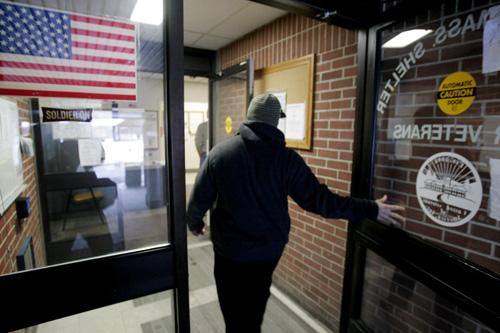Homelessness growing among recent veterans

Marine veteran of the Iraq war Mike Lally walks through the main entrance of a veterans homeless shelter, in Leeds, Mass., on Wednesday, Dec. 5, 2007. Lally did two tours of duty in Iraq while serving with the Marine Corps. Steven Senne, The Associated Press
January 21, 2008
LEEDS, Mass. – Peter Mohan traces the path from the Iraqi battlefield to this lifeless conference room, where he sits in a kilt and a Camp Kill Yourself T-shirt and calmly describes how he became a sad cliche: a homeless veteran.
There was a happy homecoming, but then an accident – car crash, broken collarbone. And then a move east, close to his wife’s new job but away from his best friends.
And then self-destruction: He would gun his motorcycle to 100 mph and try to stand on the seat. He would wait for his wife to leave in the morning, draw the blinds and open up whatever bottle of booze was closest.
He would pull out his gun, a .45-caliber, semiautomatic pistol. He would lovingly clean it, or just look at it and put it away. Sometimes place it in his mouth.
“I don’t know what to do anymore,” his wife, Anna, told him one day. “You can’t be here anymore.”
Get The Daily Illini in your inbox!
Peter Mohan never did find a steady job after he left Iraq. He lost his wife – a judge granted their divorce this fall – and he lost his friends and he lost his home, and now he is here, in a shelter.
He is 28 years old. “People come back from war different,” he offers by way of a summary.
This is not a new story in America: A young veteran back from war whose struggle to rejoin society has failed, at least for the moment, fighting demons and left homeless.
But it is happening to a new generation. As the war in Afghanistan plods on in its seventh year, and the war in Iraq in its fifth, a new cadre of homeless veterans is taking shape.
And with it come the questions: How is it that a nation that became so familiar with the archetypal homeless, combat-addled Vietnam veteran is now watching as more homeless veterans turn up from new wars?
What lessons have we not learned? Who is failing these people? Or is homelessness an unavoidable byproduct of war, of young men and women who devote themselves to serving their country and then see things no man or woman should?
For as long as the United States has sent its young men – and later its young women – off to war, it has watched as a segment of them come home and lose the battle with their own memories, their own scars, and wind up without homes.
The Civil War produced thousands of wandering veterans. Frequently addicted to morphine, they were known as “tramps,” searching for jobs.
And there was Vietnam: Tens of thousands of war-weary veterans, infamously rejected or forgotten by many of their own fellow citizens.
Now it is happening again, in small but growing numbers.
For now, about 1,500 veterans from Iraq and Afghanistan have been identified by the Department of Veterans Affairs. About 400 of them have taken part in VA programs designed to target homelessness.






